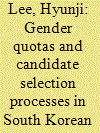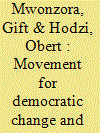|
|
|
Sort Order |
|
|
|
Items / Page
|
|
|
|
|
|
|
| Srl | Item |
| 1 |
ID:
145755


|
|
|
|
|
| Summary/Abstract |
South Korea is one of the few East Asian countries in which candidate gender quotas are legislated for all levels of government. However, the implementation of quotas has been only partially successful as political parties do not comply with quota laws in the majoritarian tier of the country’s mixed-member electoral system. To explain this non-compliance, this article examines how Korea’s party organizations and candidate selection practices have subverted quota implementation. More specifically, we employ Rahat and Hazan’s framework that disaggregates candidate selection processes into four areas—the selectorate, candidacy, centralization, and voting vs. appointment—and examine how two major Korean parties have chosen their candidates in the last three elections. By doing so, we demonstrate that in Korea’s under-institutionalized parties, where party organizations have been overshadowed by individual personalities, implementation of quotas can easily be subordinated to the clientelistic incentives of party leaders. While the parties’ centralized and exclusionary candidate selection procedures give party leaders a great deal of latitude to implement quotas, a better gender balance in the set of candidates is rarely a top priority for leaders in parties where personalism prevails. We argue that this explains why the quotas in Korea have been ineffective.
|
|
|
|
|
|
|
|
|
|
|
|
|
|
|
|
| 2 |
ID:
178260


|
|
|
|
|
| Summary/Abstract |
Nelson Chamisa is central to the political terrain of contemporary Zimbabwe. Post the soft coup of November 2017 and the death of Morgan Tsvangirai in early 2018, Chamisa became president of the Movement for Democratic Change party and contested the July 2018 presidential election. The tempo of changes in the Movement for Democratic Change presidency is not related directly to the shift from Mugabe to Mnangagwa. However, broader politics formed an important context for Chamisa’s contested claim for the Movement for Democratic Change presidency. In examining Chamisa and the Movement for Democratic Change, the article highlights linkages between personality politics and electoral mobilization, and how this relates to political party institutionalization.
|
|
|
|
|
|
|
|
|
|
|
|
|
|
|
|
| 3 |
ID:
099603


|
|
|
|
|
| Publication |
2010.
|
| Summary/Abstract |
This article examines party institutionalization in Hong Kong in order to understand the development of political parties in a political system undergoing democratization. Party institutionalization is defined as the extent to which political parties develop a systematic set of mechanisms and structures that enable them to compete effectively for political power. By examining partisanship, autonomy, and the stability of political parties in Hong Kong, the author concludes that party institutionalization is still weak, although there are signs of progress. Constitutional constraints, structural factors, lack of public support, and the problem of adaptation pose serious obstacles in the party institutionalization process. Political parties, as one of the essential conditions for democratic consolidation, have brought a new page of democratic politics to Hong Kong. However, in terms of institutionalization, political parties in Hong Kong are far from mature, thereby limiting their impact on the democratization process.
|
|
|
|
|
|
|
|
|
|
|
|
|
|
|
|
|
|
|
|
|